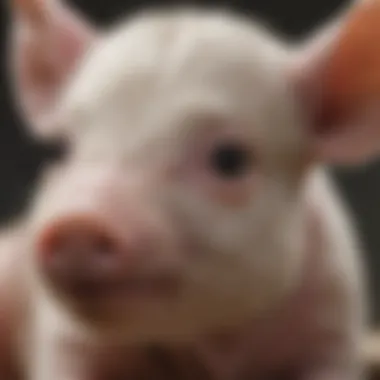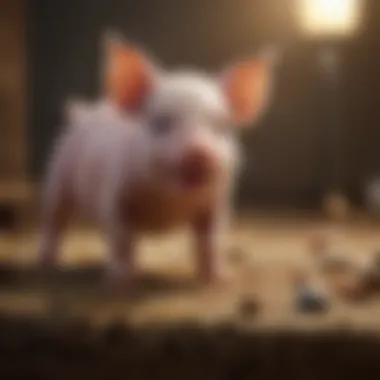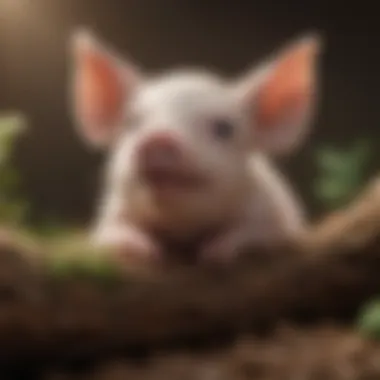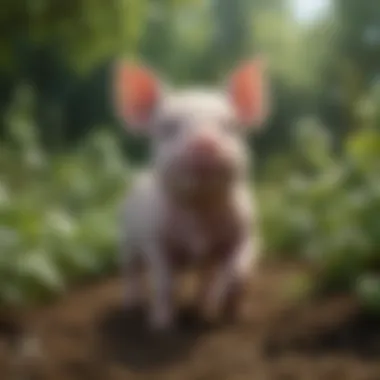The Intricacies of Mini Piglets: An In-Depth Exploration


Intro
Mini piglets have become increasingly popular as pets in recent years. Their small size and playful nature attract many families looking for a unique addition to their household. However, prospective owners must not overlook the complexities associated with their care and well-being. This article aims to shed light on the intricacies of mini piglets, including their origins, unique traits, and behavioral patterns. Understanding these elements can help ensure responsible ownership and happier lives for these animals.
Fascinating Facts About the Animal
Unique Characteristics
Mini piglets exhibit a variety of characteristics that set them apart from their larger counterparts. They typically weigh between 50 to 150 pounds, depending on the breed, and can live up to 15-20 years. Their unique features include
- A distinctive snout that aids in foraging.
- A social and intelligent nature, allowing them to interact well with humans and other pets.
- A thin layer of fur that can vary in color, adding to their charm.
These qualities make them appealing. However, it is vital to recognize that mini piglets retain many traits of their larger relatives. For example, they require ample space to roam and explore.
Extraordinary Abilities
One of the fascinating aspects of mini piglets is their intelligence. In fact, studies show that they are as smart as dogs. Quick learners, they can perform various tricks and respond well to positive reinforcement training. Mini piglets are also adept at problem-solving, displaying behaviors such as:
- Opening doors or gates
- Finding hidden food
These abilities highlight the need for mental stimulation and engagement from owners, ensuring the animal remains happy and well-adjusted.
Behavior and Habitat
Natural Habitats
In the wild, pigs are often found in forests, grasslands, and wetlands. They enjoy rooting and exploring their environment. When kept as pets, mini piglets require a similar setting to thrive. An outdoor space with access to shade and fresh air is crucial, along with a safe area where they can dig and forage.
Social Structures
Mini piglets are naturally social animals. They live in groups, which helps them learn essential skills and behaviors. Owners should consider adopting multiple piglets to provide companionship. Social interactions contribute to their emotional well-being and can prevent issues such as loneliness or boredom.
Recent Scientific Discoveries
Latest Research Findings
Recent studies on mini piglets have revealed more about their social structures and cognitive abilities. Research indicates that they can express emotions and recognize individuals' faces. This capability allows them to form strong bonds with their human caretakers.
Breakthroughs in Animal Biology
Animal biology research has also focused on the genetic makeup of mini piglets. By understanding their genetics, scientists can work towards better health management practices and breeding strategies. This information can lead to healthier animals in the future, ensuring better lives for pet mini piglets.
Cultural Significance
Animals in Folklore
Throughout history, pigs have held a significant place in various cultures. From ancient mythology to modern tales, they often symbolize prosperity and intelligence. Mini piglets, as smaller versions of their larger relatives, continue to retain this cultural relevance in the realm of pets.
Influence on Art and Literature
Mini piglets have inspired a variety of artistic expressions. Their playful and curious nature has appeared in children's books and movies, enhancing their societal presence. These representations contribute to the perception of mini piglets as wholesome and charming companions, a notion that continues to grow as the pet industry evolves.
Understanding Mini Piglets
Understanding mini piglets is crucial for several reasons. First, as more people consider keeping mini pigs as pets, it becomes necessary to grasp their unique characteristics and requirements. These small animals are not simply miniature versions of traditional pigs; they possess distinct traits that set them apart. By examining the definition and characteristics of mini piglets, potential owners can better prepare for the responsibilities that come with their care.
Definition and Characteristics
Mini piglets, often referred to simply as mini pigs or teacup pigs, are breeds bred to be smaller than their standard counterparts. The average adult weight of mini pigs ranges widely but generally falls between 60 to 150 pounds. It is essential to recognize that the term "mini" can be misleading. Not all pigs marketed as mini will stay small throughout their lives.
Moreover, characteristics such as temperament, intelligence, and social needs vary between breeds. Mini piglets are known for being social animals, often forming strong bonds with their human caregivers. Understanding these characteristics can guide people in making informed decisions about their care and training.
Physical Traits and Size Variations


The physical traits of mini piglets vary significantly, contributing to their appeal. They typically have a compact body, short legs, and a rounded snout, with skin that may range from pink to black, or even spotted patterns.
Size variations exist among different breeds. Some popular varieties include:
- Vietnamese Potbelly Pig: Known for its stocky frame and friendly demeanor.
- Juliana Pig: Often smaller in stature, with a more refined appearance.
- American Mini Pig: A breed with varied sizes, depending on lineage.
These size variations lead to differences in housing and care requirements, which are vital aspects for potential owners to consider. Furthermore, it is important to note potential health implications linked to size, as larger pigs may face specific challenges related to joint health and obesity.
Understanding these physical attributes helps future owners to provide a suitable environment and care plan.
"Awareness of their distinct traits and needs allows for a more harmonious relationship between mini piglets and their families."
Acquiring knowledge about mini piglets is an important first step in responsible pet ownership.
Historical Context
Understanding the historical context of mini piglets provides valuable insights into their development as a domestic pet. This backdrop informs current trends in ownership, care practices, and the implications surrounding their ethical treatment. The past sheds light on the genetic, social, and economic factors that shaped mini pig breeds. Recognizing these elements allows potential owners and animal enthusiasts to appreciate not only where mini pigs came from but also the responsibilities that accompany their care today.
Origin of Mini Pig Breeds
Mini pig breeds originated from larger pigs, specifically selective breeding practices aiming to reduce size. This shift began in the late 20th century when breeders sought smaller pigs that could serve as companion animals, rather than just livestock. Breeds such as the Vietnamese Pig and the Juliana Pig became prevalent during this period, largely due to their smaller size and companionable nature compared to traditional farm pigs.
The miniature versions were intended to maintain the unique traits of pigs while being manageable for household life. Through selective breeding, these traits were amplified, resulting in the contemporary mini pig. Variations now exist based on size, color, and temperament. As a result, the origins reveal a fascinating subset of pig breeds tailored for interaction with humans while ensuring some of their instinctual characteristics remain intact.
Cultural Significance Across Societies
The cultural significance of mini piglets spans various societies, reflecting diverse attitudes towards animals and companionship. In some cultures, pigs symbolize wealth and prosperity, while in others, they are viewed more pragmatically as sources of food or labor. The adoption of mini pigs as pets resonates particularly in Western societies, where pet ownership has seen a shift towards preferring smaller, more manageable animals.
Over the years, mini pigs have gained representation in popular media, influencing perceptions and increasing their desirability as pets. Gatherings of mini pig owners often celebrate these creatures, fostering communities that focus on welfare and responsible ownership. The integration of mini pigs into family life highlights the evolving relationship between humans and companion animals, encompassing themes of care, responsibility, and enjoyment.
As the understanding of mini pigs continues to grow, so do discussions around their care needs, ethical implications, and positive contributions to human life. This interplay between cultural significance and practical considerations forms a crucial foundation for current min pig ownership dynamics.
Behavior and Social Structure
Understanding the behavior and social structure of mini piglets is crucial for potential owners and enthusiasts. These aspects dictate how mini piglets interact with their environment and companions, both animal and human. Grasping these dynamics helps in creating a harmonious living space, ensuring the welfare of the animals, and fostering a positive relationship between mini pig owners and their pets.
Mini piglets exhibit a range of behaviors rooted in their natural instincts and social needs. These traits can significantly influence their happiness and health. Knowledge of their behavior can also inform training methods and care routines.
Natural Instincts and Behaviors
Mini piglets were originally domesticated from wild boars, and as a result, they retain some of their instinctive actions. For example, they have a strong rooting instinct, which means they use their snouts to dig around the ground in search of food or intriguing objects. This behavior is not just for nourishment; it is also a means of exploring their surroundings. Owners should provide safe outlets for this instinct, such as digging boxes filled with safe materials or toys.
Another important aspect of their behavior is their social structure. Mini piglets are inherently social animals. They thrive in the company of other pigs or animals, as well as with humans. When kept alone, they may develop behavioral problems such as anxiety or depression.
Common behaviors to observe include:
- Playfulness: Mini piglets engage in play, often involving chasing, nudging, or even a bit of wrestling. This not only fosters physical health but also social bonding.
- Vocalizations: Various sounds indicate different states of emotions. For instance, squealing can signify excitement or distress.
- Body Language: Pigs communicate through body posture. A relaxed posture with a wagging tail reflects comfort, while snorting or a stiff body may indicate agitation.
Social Interaction with Humans and Other Animals
Mini piglets form deep bonds with humans, provided they are socialized from a young age. They respond to positive interactions and develop attachments much like dogs. Engaging with them through gentle play, offering treats, or simply being present can strengthen this bond. This interaction is not only rewarding for the piglet but can also greatly enhance the owner's experience as they build a relationship based on trust and affection.
In addition, mini piglets can coexist with other household pets, although caution is advised. Socialization should occur gradually to prevent stress or aggression. Some dogs may be more compatible with mini pigs than others.
Barriers to social interactions must be addressed in any setting:
- Chaining or confined spaces: These limitations can lead to frustration and undesirable behaviors.
- Lack of stimulation: Time spent alone without engagement can cause restlessness.
Understanding these aspects is fundamental in ensuring mini piglets can thrive in homes, fostering not only their well-being but also ensuring they contribute positively to the household environment.
Care Considerations


Caring for mini piglets is more than a mere responsibility; it's an ethical obligation that impacts their well-being and quality of life. Awareness of their care considerations is essential for both prospective and current owners. Proper care encompasses various dimensions, including nutrition, housing, and health management. These facets not only cater to the basic needs of mini piglets but also foster a harmonious human-animal relationship. Understanding these elements can significantly enhance the experience of owning these intelligent creatures.
Nutritional Needs of Mini Piglets
Feeding mini piglets properly is crucial for their growth, development, and overall health. Mini pigs are naturally omnivorous, requiring a well-balanced diet that includes both plant and animal-based food. Quality commercial pig feed formulated for mini pigs can serve as the foundation of their diet. Alongside formulated feed, it is vital to include fresh vegetables and fruits like carrots, apples, and leafy greens.
Key Considerations for Nutrition:
- Caloric Needs: The caloric intake should match their age, weight, and activity levels. Owners should monitor their growth and adjust portions accordingly to prevent obesity.
- Portion Control: Overfeeding is a common issue, leading to health issues like diabetes and joint problems. Using a measuring cup may help in maintaining accurate portion sizes.
- Avoid Harmful Foods: Foods not suitable for mini pigs include chocolate, onion, and garlic, as these can be toxic.
Maintaining a disciplined feeding schedule supports better digestion and regularity in their health routines.
Housing and Living Environment
Setting up an appropriate living environment for mini piglets is essential for their safety and comfort. These animals require ample space for exercise and exploration. Ideally, an outdoor area, if available, should be secure and spacious, allowing them to root and roam safely.
Important Aspects of Housing:
- Shelter: Mini pigs need a sheltered space to protect them from harsh weather. A simple shed or barn with proper ventilation will suffice.
- Fencing: Secure fencing is critical. Mini pigs are curious animals and can easily escape. A fence at least four feet high is recommended, accompanied by barriers to deter digging underneath.
- Cleaning: Regular cleaning of their living area prevents the buildup of waste and potential health issues. It also aids in creating a more pleasant environment for both piglets and owners.
Creating a safe, clean, and engaging environment fosters positive behavior and reduces stress among mini piglets.
Health Management and Veterinary Care
Health management is paramount in ensuring a long, healthy life for mini piglets. Regular veterinary care must not be overlooked. This includes vaccinations, routine check-ups, and parasite control. Mini pigs are prone to specific health concerns, such as obesity and skin issues, making preventive care critical.
Health Maintenance Tips:
- Vaccinations: Vaccinate as recommended by a veterinarian. Core vaccinations are essential for preventing common illnesses.
- Regular Check-ups: Schedule annual vet visits to monitor their health status. Early detection of health issues can save suffering and significant costs later on.
- Spaying or Neutering: These procedures can help manage overpopulation and may prevent certain behavior problems.
"Regular check-ups and vaccinations are key to the health and longevity of mini piglets."
Proper health management strategies not only extend their lifespan but also enhance their quality of life. An informed and proactive approach towards a mini piglet's care leads to a fulfilling companionship.
Ownership Dynamics
Understanding ownership dynamics is crucial for anyone considering adding a mini piglet to their lives. These animals, while distinct and charming, come with a specific set of responsibilities that potential owners must understand. The dynamics primarily involve the legal framework surrounding mini pig ownership, the process of finding a reputable breeder, and the challenges that can arise during the ownership journey.
Legalities of Mini Pig Ownership
The legal status of mini pig ownership varies greatly across different regions. Some areas have strict rules regarding the ownership of mini pigs or even prohibit their keeping altogether. Owners must research laws in their specific locality to avoid potential legal complications. This includes zoning laws, licensing requirements, and regulations related to animal welfare.
For instance, certain cities might classify mini pigs as livestock rather than pets, leading to restrictions similar to those imposed on larger animals. Understanding these details is vital as failing to comply could result in fines, or worse, being forced to give away or surrender the animal. It is advisable for prospective owners to consult local legislation or speak with local authorities to grasp any nuances.
Finding Reputable Breeders
When looking for a mini piglet, finding a reputable breeder is another critical aspect of ownership dynamics. Not all breeders uphold the same ethical standards or practices. It is essential to choose breeders who prioritize the health and well-being of the animals over profit.
- Look for certifications: Breeders should be able to provide documentation regarding the health history and lineage of their piglets.
- Visit facilities: If possible, potential owners should visit the breeding facilities to assess the living conditions of the pigs.
- Ask for references: Speak to previous customers to ensure they had positive experiences.
A responsible breeder will not only provide proper documentation but will also be upfront about the care needs, potential health issues, and behavioral traits of their pigs. This can help ensure that new owners are well-prepared and informed about pet care requirements.
Potential Challenges Faced by Owners
Owning a mini pig may present various challenges. Some of these issues are related to their behavior and needs while others stem from broader societal perceptions. Below are common challenges owners might encounter:
- Behavioral concerns: Mini piglets can display stubbornness, which may lead to difficulties in training.
- Socialization requirements: These animals require significant interaction, which can be challenging to maintain.
- Health issues: Mini pigs are prone to specific health problems that may require regular veterinary visits.
These challenges highlight the need for a commitment to the welfare of the mini pig, which means being ready to engage with their unique needs continually.
Furthermore, the social aspect of owning a mini pig must be considered. Some communities may not understand or accept mini pig ownership, leading to potential conflicts with neighbors. It’s beneficial for owners to educate others about these animals to foster understanding.


In summary, navigating ownership dynamics is essential for ensuring the well-being of mini piglets and enriching the lives of their owners. By understanding the legalities, finding reputable breeders, and preparing for the challenges ahead, potential owners can foster responsible pet ownership. This creates a harmonious environment that benefits both owners and their mini pigs.
Ethical Considerations
The consideration of ethics in the realm of mini pig ownership is paramount as it influences not only the well-being of these animals but also the responsibilities of owners. Understanding the ethical dimensions can guide potential owners in making informed decisions. Key elements include the welfare of mini piglets, the implications of breeding practices, and their overall place in society.
Welfare and Happiness of Mini Piglets
Mini pig welfare encompasses various aspects of their physical and mental health. These animals require a nurturing environment that meets their basic needs, including adequate space, proper nutrition, and social interaction. Mini piglets are intelligent creatures that thrive on enrichment activities. Without stimulation, boredom can lead to behavioral issues such as aggression or anxiety.
To ensure their happiness, owners should consider:
- Socialization: Mini piglets are social animals and benefit from companionship, whether with humans or other animals.
- Space to Roam: A suitable living environment should offer enough room for them to explore and exercise.
- Mental Stimulation: Toys and challenges should be part of their daily routine.
Regular veterinary care is also crucial in monitoring their health. By prioritizing the happiness of mini piglets, owners contribute to their overall well-being and prevent issues that might arise from neglect.
Impact of Commercial Breeding Practices
Commercial breeding practices for mini pigs often raise ethical concerns. Many breeders prioritize profit over the health and welfare of the animals. This approach can result in serious health issues, including genetic disorders and behavioral problems. The intense demand for miniature pigs has encouraged breeders to prioritize size over the quality of care, leading to questionable breeding ethics.
Factors to consider regarding the impact of these practices include:
- Health Risks: Many pigs sold as "miniature" are often not fully examined, potentially leading to severe health repercussions for the animal.
- Lack of Regulation: The breeding of mini pigs is often unregulated, leading to irresponsible breeding practices.
- Public Awareness: Consumers need to be educated about responsible pet ownership and the implications of purchasing from commercial breeders.
For ethical mini pig ownership, selecting reputable breeders who prioritize animal welfare and health is crucial. Understanding commercial breeding's impact can foster more informed decisions for potential owners, promoting better standards across the industry.
"Ethics in pet ownership is not just about caring for the animal; it’s about ensuring the health and happiness of future generations."
Overall, discussing ethical considerations regarding mini pig ownership will raise awareness about the necessary standards for care and breeding, enhancing the experience for both the pet and owner.
Community and Culture
The community and culture surrounding mini piglets play a significant role in their popularity and societal presence today. Understanding these dynamics helps illuminate the implications of owning such animals and the relationships they foster within society.
Mini Pigs in Popular Media
Mini pigs have garnered considerable attention in various forms of popular media. Their charming, intelligent, and often adorable behaviors have made them a favorite among social media enthusiasts. Platforms like Instagram and TikTok showcase mini pigs engaging in playful antics, often portraying them in various lifestyles. This visibility contributes to the growing interest in mini pigs as pets.
Notably, shows such as The Amazing Race and Sister Wives have featured mini pigs, promoting their friendly nature. Celebrities, including Paris Hilton and the late George Clooney, have also helped raise awareness about these animals through their ownership. These instances reflect how media representation can shape public perceptions and increase demand for owning mini pigs. Their portrayal often glamorizes the idea of keeping mini pigs, yet it is crucial for potential owners to understand the responsibilities that come with ownership.
The Role of Mini Pig Owners in Animal Advocacy
Mini pig owners often find themselves in a position of advocacy for their pets. Many owners educate others about responsible ownership, welfare considerations, and the reality of caring for mini pigs. This advocacy is particularly important given the issues surrounding commercial breeding practices, which can lead to unhealthy animals or unsupported expectations.
Advocacy can take several forms:
- Informational Campaigns: Many owners participate in online forums and local meetings to discuss the challenges and needs of mini piglets.
- Rescue Efforts: Some owners engage in rescue activities, helping abandoned or neglected mini pigs find new homes.
- Community Engagement: They often form local clubs or groups to share experiences, resources, and raise awareness about ethical ownership.
"The commitment of mini pig owners extends beyond ownership. They become stewards of their community, highlighting the importance of suitable care and humane treatment of these creatures."
Final Thoughts
Reflecting on the topic of mini piglets, several critical elements emerge. These unique creatures require thoughtful consideration from a prospective owner. Understanding their needs, behaviors, and welfare is paramount. As discussed in previous sections, mini piglets possess distinctive characteristics that set them apart from traditional pet options.
Summary of Key Points
- Understanding the Species: Mini piglets are not simply small pigs; they have unique behavioral traits and health needs.
- Historical Context: The origin and cultural significance of mini pigs shape how they are viewed today in society.
- Care Requirements: Their nutritional, social, and environmental needs are essential for their wellbeing.
- Ownership Dynamics: Legal and ethical considerations play a significant role in responsible ownership.
- Community Engagement: Mini pigs impact popular culture and involve their owners in advocacy efforts.
Insgesamt, these components highlight the importance of informed decision-making. Ignoring these aspects can lead to unfortunate consequences for owners and the pigs alike.
Future of Mini Pig Ownership
Looking ahead, the future of mini pig ownership presents both opportunities and challenges. As interest in these animals continues to grow, breeders and organizations must prioritize ethical practices. There will be a continued shift toward responsible breeding that respects the welfare of the animal.
In the coming years, educational initiatives will be crucial. Helping potential owners understand the complexities of caring for mini piglets is essential. Awareness campaigns may focus on the responsibilities involved in owning a mini piglet, ranging from dietary needs to social interactions.
Additionally, a rise in regulations may occur. Local authorities may implement stricter guidelines on mini pig ownership to prevent irresponsible breeding and ensure the welfare of these animals. Such measures are beneficial to protect both the pigs and prospective owners.
In summary, mini pig ownership requires deep commitment and understanding. As society learns more about these intriguing creatures, responsible ownership will become a key part of the discussion.







